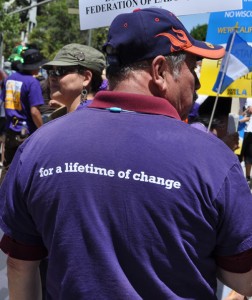 Mary Kay Henry, president of the Service Employees International Union (SEIU), often boasts about her commitment to a $15 minimum wage and unionized fast-food industry—two alleged remedies for “the crisis of low wages.” Yet when it came to endorsing Hillary Clinton, Henry and other SEIU officials were more than willing to ignore Clinton’s skepticism of a $15 hourly wage.
Mary Kay Henry, president of the Service Employees International Union (SEIU), often boasts about her commitment to a $15 minimum wage and unionized fast-food industry—two alleged remedies for “the crisis of low wages.” Yet when it came to endorsing Hillary Clinton, Henry and other SEIU officials were more than willing to ignore Clinton’s skepticism of a $15 hourly wage.
For context: The Democratic nominee supports a $12 hourly federal minimum wage, although she has backed state efforts to go higher. “Let’s not just do it for the sake of having a higher number out there,” Clinton argued in 2015. “But let’s get behind a proposal that actually has a chance of succeeding.”
As WikiLeaks recently revealed, this noncommittal position worried some union bosses. According to an email from Nikki Budzinski, Clinton’s labor outreach director, executive board members of SEIU Local 1199—one of the fiercest Fighters for $15—“voiced concern around where the Secretary is on the minimum wage increase to $15 rather than $12.” But the SEIU’s national headquarters put that concern to rest. Peter Colavito, the union’s chief of staff, “reiterated that [Hillary Clinton’s] position on the minimum wage was not a part of their test for endorsement”—easing the way for a Clinton endorsement. (The SEIU officially backed her four days later.)
The SEIU has spent over $70 million on the Fight for $15 thus far, and it is arguably the defining issue for the union. So it’s unusual, to say the least, for the union to give Clinton a pass on endorsing their signature effort. It begs the question: Is the SEIU more concerned about policy or politics?
The Center for Union Facts is exempt from federal income tax under §501(c)(3) of the Internal Revenue Code, and does not support or oppose candidates for public office.



